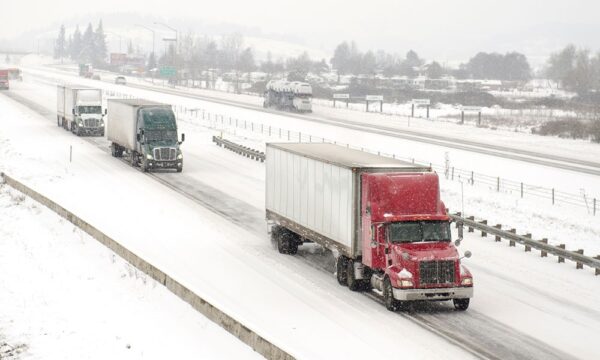
As “the biggest snow threat” in years named Helena bears down on the South, our home state of Georgia is preparing our roads for dangerous conditions.
Snowy roads can often be dangerous – this isn't new information. Due to ice, snow, sleet and other forms of bad weather, driving will become difficult and possibly hazardous. State agencies are calling for all drivers to stay at home during the peak of the snowfall. Good advice as storms in the past have often been deadly resulting in the unnecessary loss of life due to being in the wrong place at the wrong time.
And while all drivers need to be extra alert during these times, it is truck drivers who should proceed with caution. Trucking accidents are often life-changing events and we've created this short list of reminders so you can proceed to your destinations as safe as possible.
5 Winter Storm Tips Helping Georgia Truck Drivers
At Fried Goldberg, we’ve put together a list of simple safety tips to help truck drivers when getting behind the wheel this winter. We know many drivers have had experience in winter weather, there are those who are not often exposed to snow or sleet, and we hope these tips can help everyone have a safe journey as winter storm Helena is sure to bring plenty of traffic problems.
1. Complete a Pre-Trip Inspection
One of the best ways to promote road safety: Always be prepared. In order to accomplish this goal, it’s imperative to complete a trip inspection. As a professional truck driver, you most likely know that you are required to inspect your vehicle before every trip. During this inspection and especially during this snowy season, pay special attention to important items of the truck, including tires, snow chains, wiper blades, fluids and lights. Throughout these colder months, you can never check your truck “too much.”
2.Plan Your Trip
Before you even put the key into the ignition, plan your trip. Specifically, map out your entire route, and take time to get updated on the latest news on the storm watch. Remember, due to various factors (ice, snow, sleet, etc.), roads may either be closed, or exceptionally difficult to navigate. Give yourself extra time to drive slower. It’s also a good idea to have a few “safe stops” planned, in the chance that road conditions become too bad to finish your trip.
3.There’s Safety in Slower Speeds and Extra Space
For obvious safety purposes, you should never drive over the speed limit. However, when freeways and roadways are altered because of bad weather, it’s not only important to mind the speed limit, but even drive a little slower than the suggested miles per hour posted. You may be on a tight schedule, but the slower you drive, the more time you’ll have to react to those unpredictable occurrences (that’s why step two is so vital). Hydroplaning and sliding happen more frequently at higher speeds, as well as loss of control due to slippery roadways. Be patient.
4. Zero Distractions This Weekend
Because of the present bad weather, you may find yourself slipping and sliding, resulting in an impromptu sharp turn. These sharp turns or moves can cause you to lose control of the vehicle. If that happens, the consequences stand to be catastrophic. Always keep both hands firmly on the steering wheel to help keep your vehicle on its intended course. During bad weather it is imperative to save the eating, drinking, talking and other distractions for when you reach your destination safely.
5. Wait It Out
You may not have the luxury of other professions, where you can stay home during fits of bad weather. However, never put your safety or the safety of other drivers in jeopardy. If conditions are extremely poor, to the point where you feel uncomfortable being behind the wheel, do the right thing. The roads will be cleared soon and you will be back on your way. There’s nothing more important than safety, and we appreciate safe truck driving practices.
Stay Warm and Safe During Georgia's Winter Storm
At Fried Rogers & Goldberg, our team of lawyers has represented too many claims where drivers have been injured by truck driving negligence. We join the call by state agencies for drivers to stay at home, or if you must drive, to drive with great caution.
